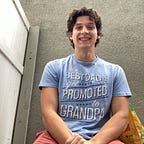Breaking The Scene (Westworld — Visualized Argument)
Here’s a show that, similar to Good Place, is wildly complex and hard to understand from a bird’s eye view. To help viewers understand, the writers create scenes like this, which ground the audience in personal, rather than philosophical, drama.
Where it comes from: Westworld, Season 1, Episode 2
Written by: Lisa Joy and Jonathan Nolan
Scene Context:
William and Logan have entered a western theme park in which the “hosts” are robots that look, act, and feel like humans.
Scene Conflicts:
- William wants to truly experience the world he’s apart of
- Logan wants to assert dominance over the hosts
Scene Outline:
- William and Logan are eating dinner at a restaurant. William looks over at other diners.
- Logan remarks that it’s hard to tell the difference between human and robot. Pulls out his gun and points it at a diner, says it’s the only way to find out.
- William has Logan lower the gun. Asks to at least finish eating.
- Logan explains that William is too afraid of making a mess. Remarks he’s the same at work.
- William makes eye contact with an old man he had saved earlier in the episode. The old man comes to their table, telling them about a quest of sorts for them to explore.
- Logan profanely tells the old man to leave. The old man ignores him, continues to talk to William.
- Fed up, Logan stabs the old man through the hand. Gets up and leaves, has William follow him out.
Why It Works:
- Conflict with the Setting: One of the key points of conflict in this scene is one which doesn’t directly reveal itself. Both of these characters are not part of this world, but are instead visitors. This makes their argument, which breaks the plain reality of this world, especially tense- they are the only people who know the reality of the world in this scene. They are effectively gods in this world, making the results of this scene especially dire.
- Shifting Visualization of Argument: This is an argument which we see William and Logan have in nearly every scene between them. At the same time, it’s an argument which never really runs stale. Why? Because the writers continually provide different ways to explore this argument. In one scene, Logan might be trying to make his point by offering up the fun hedonism that comes with entering someone else’s reality. In another, William will be trying to reinforce his argument by showing off the outright humanity inherent in the hosts. Regardless, it always comes down to the same points, but they’re always visualized in different forms which allow the audience to constantly shift their understanding of the argument’s stakes.
- Sharp Left Turn: The audience is able to take up the perspective of William, who simply wants to view this place as real. So when the old man approaches him with a “quest”, we, like William, are excited! And as the old man begins to lull us into a sense of security, and our guards have fallen down — BAM! Logan sticks a knife through the man’s hand. It’s horrifying, cruel, and a HUGE departure from what we were just watching. This builds the story’s continually unsettling tone, one which never allows the viewer to trust what they’re seeing.
- Definition By Contrast: This is an argument that extends beyond simple words. Rather, both Logan and William are entirely built around their beliefs. Logan is a cruel sociopath who doesn’t care at all about how his actions may affect those around him, while William is hyper-aware of himself and the manner in which he conducts himself, taking care constantly to avoid offending anyone. So when they argue over whether these “hosts” can be people, it’s more than just a theoretical proposition, but a debate of who has the superior philosophy.
Summary:
Westworld is an exceedingly complex show, with every episode adding more cogs and plots into the already-massive world. So it’s important that scene like this exist, in which the show’s lofty debate can be succinctly visualized. By having these characters embody separate sides of the show’s central argument, the audience is allowed the opportunity to witness this argument play out in a way that feels both natural and engaging.
